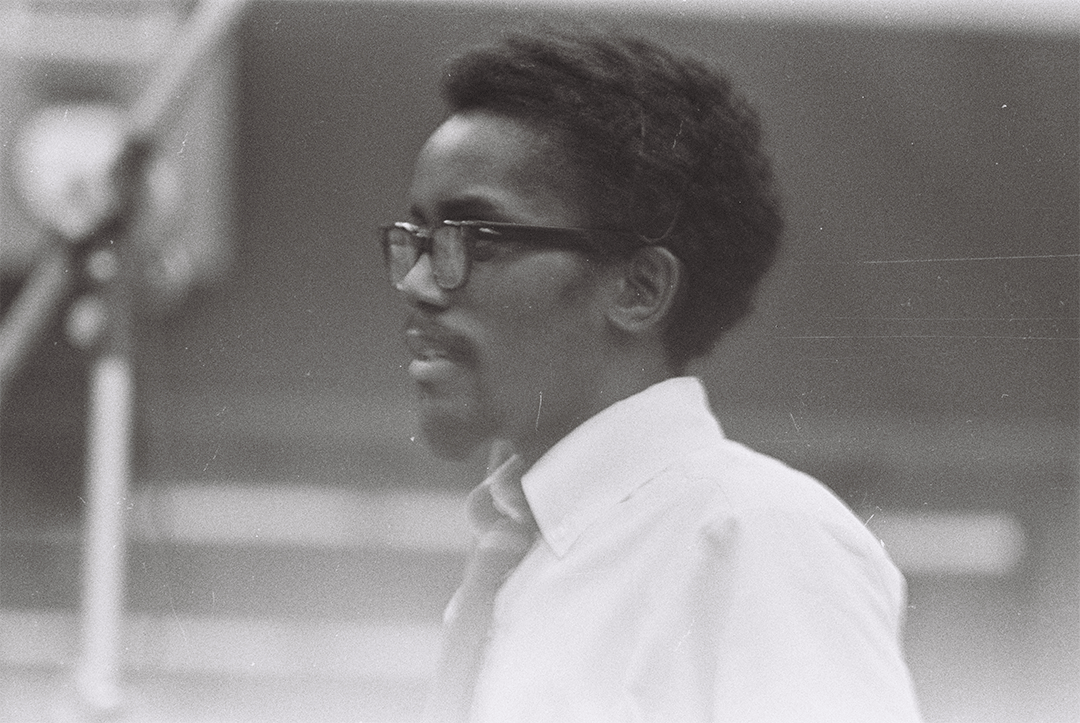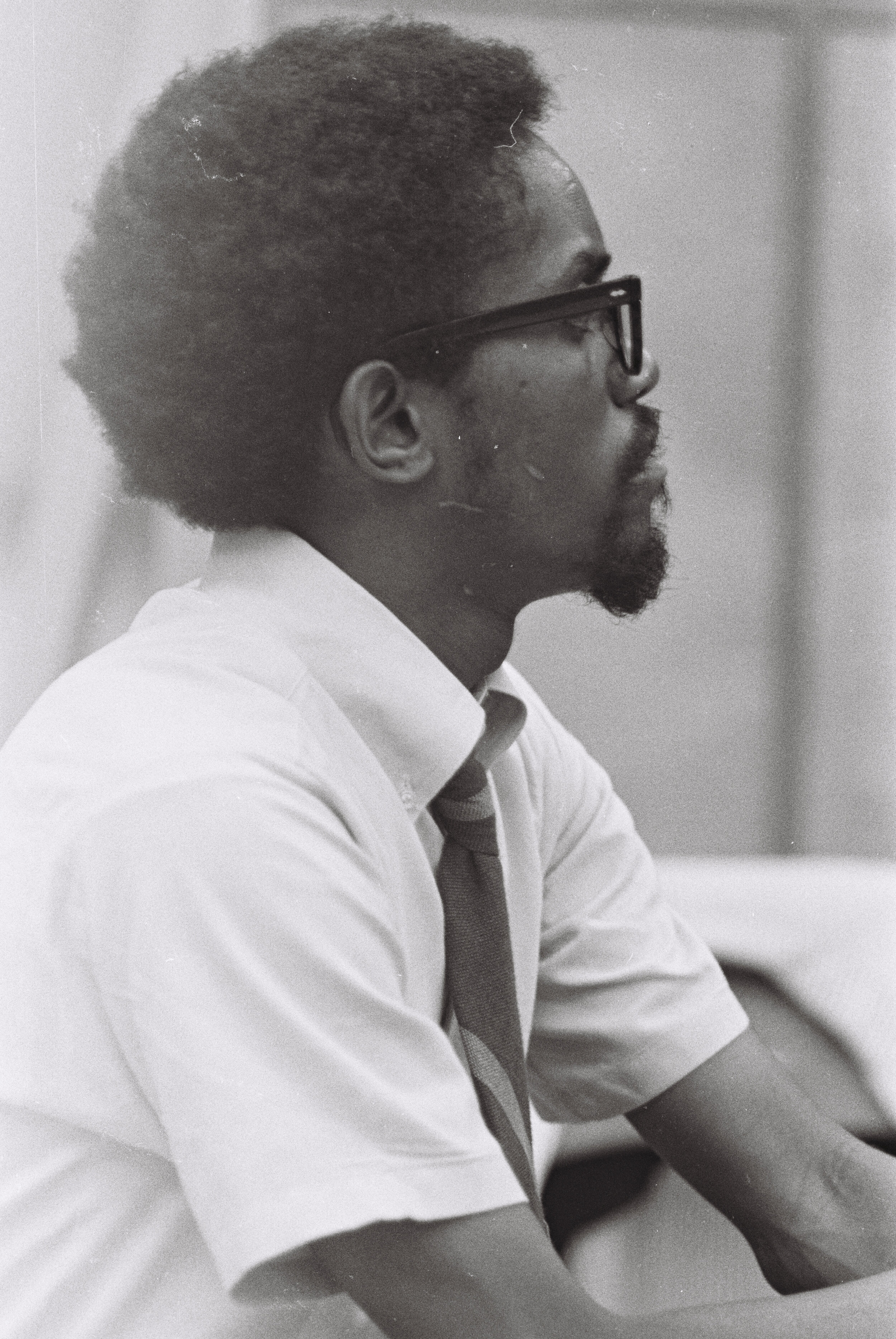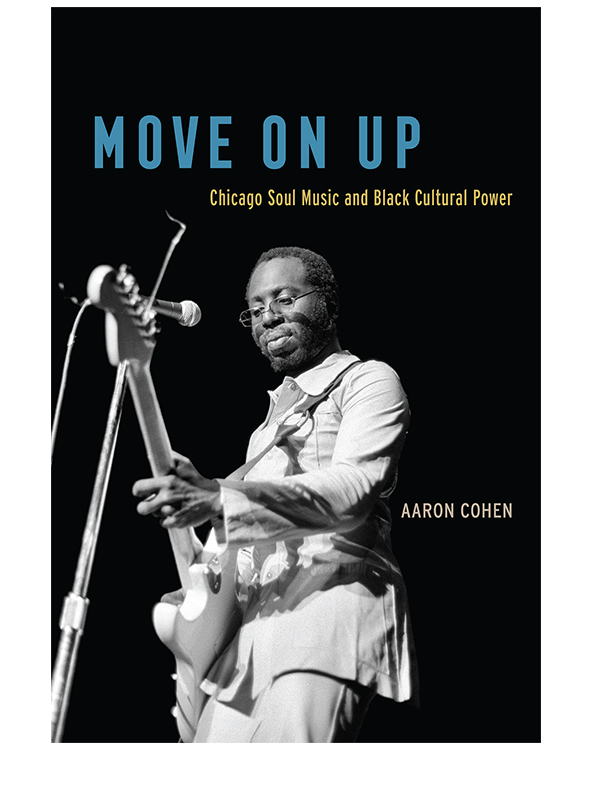
Issue No.2–1967-1976 ©FEBRUARY 2020 #312Soul // Pictured: Jerry Wilson, Joe Thomas, Willie Woods
The 1960s were a tumultuous decade that saw Black Americans fight for equal rights. A revolution was underway, and Chicago’s Black musical artists channeled it to create a new brand of music.
This generation of artists was innovating constantly. One of the most notable was Curtis Mayfield. Already a successful artist, Mayfield along with Eddie Thomas founded Curtom Records across the street from the grandiose Civic Opera House in 1968. Mayfield’s 1970 debut Curtis, featuring masterpieces like “Move On Up,” became a classic of the Chicago soul sound.
Eddie Thomas (left) and Curtis Mayfield (right)
Barbara Acklin and Eddie Thomas
Willie Henderson and Vocalo Radio’s Ayana Contreras talk about what makes the Chicago sound.
Meanwhile at a nondescript two-flat on South Michigan Avenue’s “Record Row”...
Brunswick/Dakar Records’ Tom “Tom Tom 84” Washington contributed to arranging one of the most recognized works of the era, The Chi-Lites’ “Are You My Woman? (Tell Me So),” famously sampled in Beyoncé’s hit “Crazy In Love.”
Fans by the Chi-Lites’ Tour Bus
Pianist / Arranger Tom Washington
During his work as an arranger, Tom Tom was an advocate for powerful instrumentation and became one of the main authors of the “horn sound of Chicago.” He went on to write and arrange classic songs for Major Lance; Tyrone Davis; Barbara Acklin; the aforementioned Chi-Lites; Leroy Hutson; Millie Jackson; Carl Davis; Loleatta Holloway; Earth, Wind & Fire; The Jacksons; and many others. His innovative work ushered in the Afro-futuristic sounds of funk and the smooth disco beats of the late 1970s.
Listen to Tom Washington talk about the emotive power of real instruments.
Willie Henderson talks about the pressure of being a studio musician along Chicago’s Record Row.
Watch this video short on Tom Washington, created by Vince Lawrence.

Helping bridge the first wave of soul with this new era was the legendary producer, arranger, and musician Charles Stepney.
Stepney started at Chess Records arranging notable songs by other brilliant black Chicago musicians of the era, like The Dells’ “There Is,” Ramsey Lewis’ “Les Fleur,” Earth, Wind & Fire’s “Reasons.” Charles was also instrumental in forming the pioneering psychedelic soul band Rotary Connection. The band featured a young Minnie Riperton on vocals.
Earth, Wind & Fire performing in 1982
Minnie Riperton July 1974
Of the many things that differentiate the Chicago sound from the Motown or Philly sounds, one of the most notable is its virtuosity—developed thanks to the teachings of James L. Mack. As a music instructor at Crane Junior College, Mack taught students to incorporate classical theories and techniques into jazz, soul, and pop. Mack’s students, known as the “Mack Men,” applied his teachings professionally.
James L. Mack
They created a sound that was more layered and versatile than other cities.
Prominent Crane grads include Tom Washington, fellow Brunswick Records arranger Willie Henderson, Nancy Wilson, Jerry Butler, Tyrone Davis, Della Reese, Walter Jackson, Little Milton, Verdine White, and founding members of Earth, Wind & Fire, Louis Satterfield, Don Myrick, and Maurice White.
James L. Mack
Pianist / Arranger Tom Washington
Universal Recording, Studio A. // Raymond Orr, Murray Watson, trombonist Morris Ellis, and John Avant
Willie Henderson, Tom Washington, and Jimmy Lee Tilman recount the teachings of James L. Mack at Crane Junior College.
Image courtesy of Chuckmans Photos on Wordpress: Chicago Nostalgia and Memorabilia
As with any genre, having a community space to nurture young musicians is crucial, and ’60s and ’70s Chicago soul found one at the Affro-Arts Theatre in the Oakland neighborhood.
Known as a haven for Black intellectuals, activists, community organizers and creatives,
the Affro-Arts Theatre became a sort of incubator for Chicago soul. Resident bands included The Jazzmen and the Artistic Heritage Ensemble who eventually merged to form The Pharaohs, led by Don Myrick, Charles Handy, and Louis Satterfield. They eventually joined fellow Chess session drummer Maurice White to form the band Earth, Wind & Fire. Groups like these were instrumental in inspiring the next generation of Black musicians in Chicago. (Listen to one of the first recordings of Maurice playing the kalimba on the Ramsey Lewis Trio's 1969 track "Uruhu.")
The Pharaohs // Big Willie Woods, Derf Reklaw, Don "Hippo" Myrick, unknown, and Charles Handy on far right
Ayana Contreras and Willie Woods discuss the influence of the Affro-Arts Theatre on the era’s music and dance scenes.
The years spanning the latter portion of the Civil Rights Era brought tremendous challenges for Chicago’s Black community. But just as they had done in decades prior, the community kept moving on up. The era’s movements became inspirations not just for creating a more equitable society, but amazing music, too. Music from this time and place is now heralded as some of the most iconic of the 20th century.
And Chicago soul’s influence continues into the 21st, as artists try to recapture those magical Chicago sounds.
Mavis Staples (centered)
Soulstress Spotlight
Sheryl Swope and The Vashonettes
Taking their name from the dance school the four girls attended, The Vashonettes began performing together in the late 1960s. Led by Sheryl Swope, the group recorded for Checker Records before going on to sing background vocals on Donny Hathaway’s socially conscious debut album, Everything Is Everything. Though the group’s talents have largely been unsung, they recently made it onto a Billboard playlist by indie darlings, Wild Belle.
Hear from Sheryl Swope about the group’s pop-soul beginnings, their revolutionary recordings, and touring with legends.
#312Samples
Chicagoans like Curtis Mayfield, the Chi-Lites, Minnie Riperton, Quincy Jones, and many more have their music sampled into songs that most people probably aren’t aware of. Here’s a small portion of the original songs, arrangements, and hooks from Chicago’s black artists and the new songs that sampled their work:
Compare the original Chicago soul hit to the sample driving the song, which has been declared the greatest of the 21st century so far.
1967-1975 Playlist
Enough reading. It’s time for listening. Click to hear some of the tracks that made history!
Additional Resources
Watch the incredible journey of Chicago soul legend Mavis Staples, whose music inspired artists like Prince and Wilco.
Get 20 percent off during the month of February—just type in SOULCLUB at checkout.

















